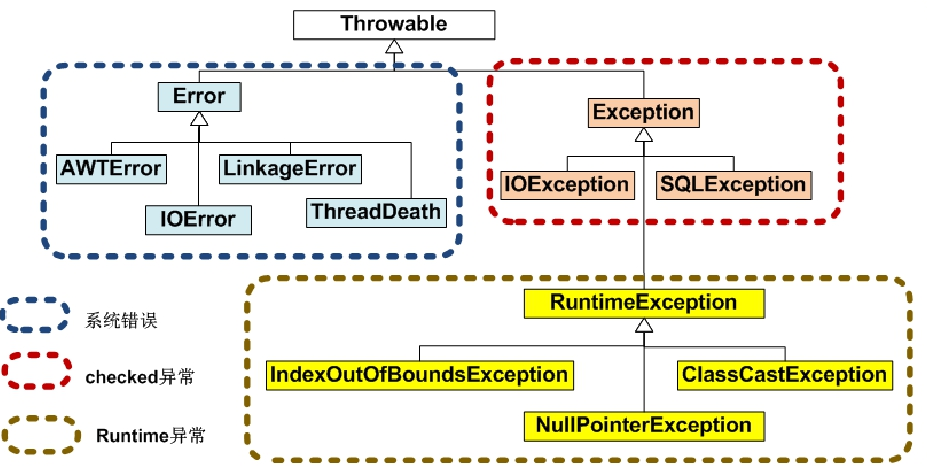一、观察代码,了解异常处理机制
import javax.swing.*;
class AboutException {
public static void main(String[] a)
{
int i=1, j=0,k;
// k=i/j;
try
{
k = i/j; // Causes division-by-zero exception
throw new Exception("Hello.Exception!");
}
catch ( ArithmeticException e)
{
System.out.println("被0除. "+ e.getMessage());
}
catch (Exception e)
{
if (e instanceof ArithmeticException)
System.out.println("被0除");
else
{
System.out.println(e.getMessage());
}
}
finally//finally会执行地代码
{
JOptionPane.showConfirmDialog(null,"OK");
}
}
}
输出:被0除. / by zero
从中我们可以看出,在try中一共有两个异常,但最终只执行了ArithmeticException异常,这就代表着try的运行就如同他的名字一样,尝试一下,遇到错误的话就抛出exception,而catch会根据exception的种类不同捕捉异常,最后会输出相应的错误类型,而finally是无论如何都会执行。
有关JAVA中抛出的exception类型:
在上面的代码中我们可以看到,try遇到错误的时候会抛出exception错误,exception的类型在如下:

二,浮点数的异常
public class ThrowDemo {
public static void main(String[] args) {
try {
double data = 100 / 0.0;
System.out.println("浮点数除以零:" + data);
if(String.valueOf(data).equals("Infinity"))
{
System.out.println("In Here" );
throw new ArithmeticException("除零异常");
}
}
catch(ArithmeticException e) {
System.out.println(e);
}
}
}

输出:
浮点数除以零:Infinity
In Here
java.lang.ArithmeticException: 除零异常
为啥会输出Infinity呢?
因为浮点数在除0时,他不是把他当做0而是看做是最小值,因此得出的结果为极大值。
三、多层异常的捕获
public class CatchWho {
public static void main(String[] args) {
try {
try {
throw new ArrayIndexOutOfBoundsException();
}
catch(ArrayIndexOutOfBoundsException e) {
System.out.println( "ArrayIndexOutOfBoundsException" + "/内层try-catch");
}
throw new ArithmeticException();
}
catch(ArithmeticException e) {
System.out.println("发生ArithmeticException");
}
catch(ArrayIndexOutOfBoundsException e) {
System.out.println( "ArrayIndexOutOfBoundsException" + "/外层try-catch");
}
}
}
输出:
ArrayIndexOutOfBoundsException/内层try-catch
发生ArithmeticException
当内层的try抛出异常,会被最近的符合要求的catch捕获,之后又抛出一个新的异常,再被离他最近的符合要求的catch捕获,因此输出如上
再看接下来的多层异常捕获
public class CatchWho2 {
public static void main(String[] args) {
try {
try {
throw new ArrayIndexOutOfBoundsException();
}
catch(ArithmeticException e) {
System.out.println( "ArrayIndexOutOfBoundsException" + "/内层try-catch");
}
throw new ArithmeticException();
}
catch(ArithmeticException e) {
System.out.println("发生ArithmeticException");
}
catch(ArrayIndexOutOfBoundsException e) {
System.out.println( "ArrayIndexOutOfBoundsException" + "/外层try-catch");
}
}
}
输出:
ArrayIndexOutOfBoundsException/外层try-catch
在最内层的异常抛出后,内层没有可以接受异常的catch,就跑到外层的try结构里,发现也没有,就跳出外层的try,被外层的catch接受,输出上面的内容。
四、多层嵌套导致finaly执行顺序的差异
public class EmbededFinally {
public static void main(String args[]) {
int result;
try {
System.out.println("in Level 1");
//result=100/0; //Level 1
try {
System.out.println("in Level 2");
//result=100/0; //Level 2
try {
System.out.println("in Level 3");
result=100/0; //Level 3
}
catch (Exception e) {
System.out.println("Level 3:" + e.getClass().toString());
}
finally {
System.out.println("In Level 3 finally");
}
result=100/0; //Level 2
}
catch (Exception e) {
System.out.println("Level 2:" + e.getClass().toString());
}
finally {
System.out.println("In Level 2 finally");
}
result = 100 / 0; //level 1
}
catch (Exception e) {
System.out.println("Level 1:" + e.getClass().toString());
}
finally {
System.out.println("In Level 1 finally");
}
}
}
输出:
in Level 1
in Level 2
in Level 3
Level 3:class java.lang.ArithmeticException
In Level 3 finally
Level 2:class java.lang.ArithmeticException
In Level 2 finally
Level 1:class java.lang.ArithmeticException
In Level 1 finally
通过不同的异常导致有些try语句块未能执行,其原因在于发生异常的try块外有无final语句,如果有就会执行,那么凡是在发生异常的try语句块里的finaly语句将都不会执行。
![]()
话说finaly语句块一定会执行吗?
public class SystemExitAndFinally {
public static void main(String[] args)
{
try{
System.out.println("in main");
throw new Exception("Exception is thrown in main");
//System.exit(0);
}
catch(Exception e)
{
System.out.println(e.getMessage());
System.exit(0);
}
finally
{
System.out.println("in finally");
}
}
}
输出:
in main
Exception is thrown in main
当发生异常后,catch捕获后自动结束程序,那么之后的finaly语句块就不会被执行了。


// UsingExceptions.java
// Demonstrating the getMessage and printStackTrace
// methods inherited into all exception classes.
public class PrintExceptionStack {
public static void main( String args[] )
{
try {
method1();
}
catch ( Exception e ) {
System.err.println( e.getMessage() + "
" );
e.printStackTrace();
}
}
public static void method1() throws Exception
{
method2();
}
public static void method2() throws Exception
{
method3();
}
public static void method3() throws Exception
{
throw new Exception( "Exception thrown in method3" );
}
}
输出:
Exception thrown in method3
java.lang.Exception: Exception thrown in method3
at PrintExceptionStack.method3(PrintExceptionStack.java:28)
at PrintExceptionStack.method2(PrintExceptionStack.java:23)
at PrintExceptionStack.method1(PrintExceptionStack.java:18)
at PrintExceptionStack.main(PrintExceptionStack.java:8)
通过printStackTrace()打印方法调用堆栈,我们可以跟踪到程序的出错来源和传播路径
五、自定义异常
package com.test1;
import java.util.Scanner;
//自定义的异常
class MyException extends Exception
{
public MyException(String Message) {
super(Message);
}
public MyException(String message, Throwable cause) {
super(message, cause);
}
public MyException( Throwable cause) {
super(cause);
}
}
class Sanj
{
private double x,y,z;
public Sanj(double x, double y, double z) {
super();
this.x = x;
this.y = y;
this.z = z;
}
//调用异常的方法
public void getArea() throws Exception
{
int flag=0;
if(this.x+this.y<=this.z||Math.abs(this.x-this.y)>=this.z)
{
flag=1;
}
if(flag==1)
{
throw new MyException("NotSanjiaoException");
}
else
{
double sum=(this.x+this.y+this.z)*1.0/2;
double ans=Math.sqrt(sum*(sum-this.x)*(sum-this.y)*(sum-this.z));
System.out.println("三角形面积为:"+ans);
}
}
public void showInfo() throws Exception
{
int flag=0;
if(this.x+this.y<=this.z||Math.abs(this.x-this.y)>=this.z)
{
flag=1;
}
if(flag==1)
{
throw new MyException("NotSanjiaoException");
}
else
{
System.out.println("三边长分别是:"+this.x+" "+this.y+" "+this.z);
}
}
}
public class Demo1 {
public static void main(String[] args) {
// TODO Auto-generated method stub
double a,b,c;
Scanner in=new Scanner(System.in);
System.out.println("请输入三角形三个边(整数):");
a=in.nextDouble();
b=in.nextDouble();
c=in.nextDouble();
Sanj s=new Sanj(a,b,c);
//try-catch语句块
try {
s.getArea();
} catch (Exception e) {
// TODO Auto-generated catch block
System.out.println(e.getMessage());
}
try {
s.showInfo();
} catch (Exception e) {
// TODO Auto-generated catch block
System.out.println(e.getMessage());
}
}
}